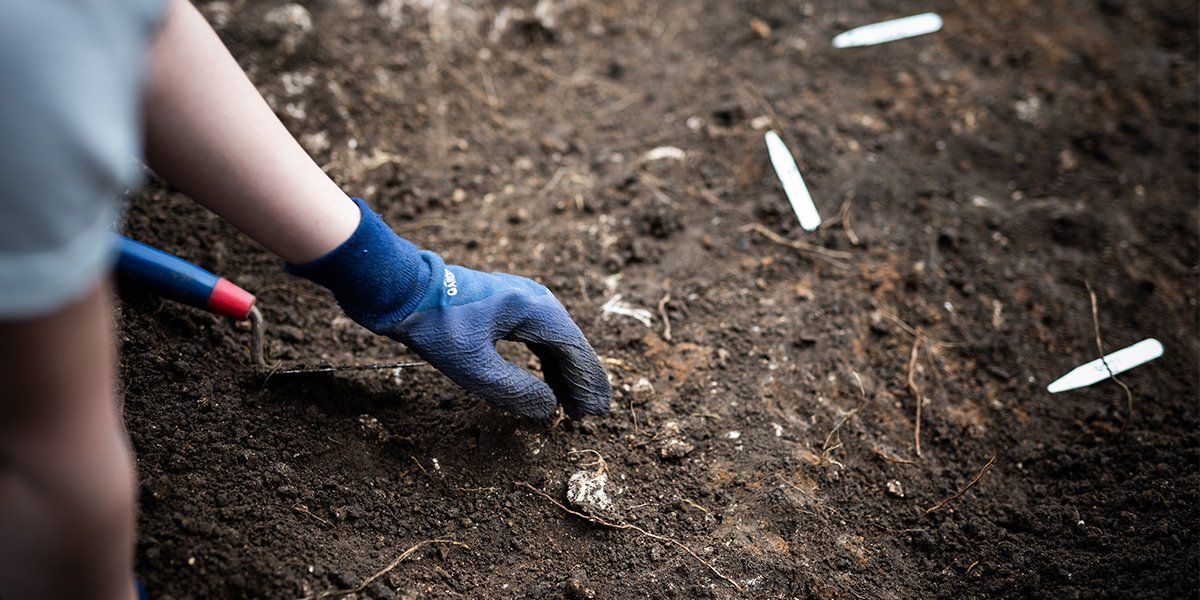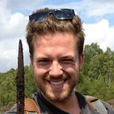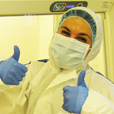View semester dates
2 years part-time,
3 years part-time

Study at the frontiers of archaeological science
Year of entry: 2026 (September)
Bioarchaeology at York combines advanced osteoarchaeological techniques with the molecular analysis of human remains. You'll be encouraged to immerse yourself in the study of stable isotopes, lipid residue analysis, palaeoproteomics and ancient DNA – and play an active role in the development of new techniques in this constantly evolving branch of archaeology.
We offer students the unique opportunity to design their own masters course based on their interests and future careers, with a range of core subjects that will underpin their understanding of osteoarchaeology and biomolecular archaeology alongside a broad suite of option modules.
You'll be taught by leading academic specialists from the Department’s BioArCh centre for bioarchaeology who work on a range of cutting-edge research and commercial projects that feed into their teaching. We offer students dedicated independent lab time (open labs) with human and animal bones to deepen their anatomical knowledge.
Dissertation projects offer the opportunity to specialise further in your chosen area of focus, including practical skills to enhance employment prospects or prepare students for doctoral research. Dissertation projects are often associated with live research projects or collections and could involve biomolecular analysis of human, animal or plant remains (ancient DNA, stable isotopes, proteins), artefacts (organic residue analysis), osteoarchaeological and palaeopathological analysis, microscopy, radiography, SEM, pXRF and a range of other techniques in world-class facilities. The optional Professional Practice module provides advanced training in osteoarchaeology.

It was incredibly stimulating to see how much I developed as an academic over the time. As a mature student with years away from studies, due to excavations, I only have positive things to say about my studies in York, and would anytime recommend it to others.
Through a combination of academic studies, practical training and dissertation research, this course provides a thorough grounding in all aspects of bioarchaeology theory, investigation and practice:
Core modules
Option modules
You'll choose option modules from examples including:
You'll also have the opportunity to choose options from our full module catalogue. Some option module combinations may not be possible. The options available will confirmed after you begin your course.
Our modules may change to reflect the latest academic thinking and expertise of our staff, and in line with Department/School academic planning.
You'll complete a 10,000-word dissertation on your research.
You will receive support, advice and guidance from your dissertation supervisor throughout your project. The range of expertise of our staff means we can provide you with guidance on a wide range of topics. You will have one-to-one meetings with supervisors across Semester 2 and the Summer Semester.
Examples of previous dissertations include:
Every course at York is built on a distinctive set of learning outcomes. These will give you a clear understanding of what you will be able to accomplish at the end of the course and help you explain what you can offer employers. Our academics identify the knowledge, skills, and experiences you'll need upon graduation and then design the course to get you there.
| Study mode | UK (home) | International and EU |
|---|---|---|
| Full-time (1 year) | £12,500 | £27,250 |
| Part-time (2 years) This is the year 1 fee. Fees for future years are subject to confirmation. |
£6,250 | £13,625 |
| Part-time (3 years) This is the year 1 fee. Fees for future years are subject to confirmation. |
£4,167 | £9,083 |
Students on a Student Visa are not currently permitted to study part-time at York.
For courses which are longer than one year, the tuition fees quoted are for the first year of study.
UK (home) or international fees? The level of fee that you will be asked to pay depends on whether you're classed as a UK (home) or international student. Check your fee status.
Find out more information about tuition fees and how to pay them.
We don't anticipate there being any additional fees associated with this course. All books and resources you need will be available in the library or online and it isn't mandatory to buy your own copies. You may wish to set aside a small budget for photocopying, depending on how you like to work.
Discover your funding options to help with tuition fees and living costs.
We'll confirm more funding opportunities for students joining us in 2026/27 throughout the year.
If you've successfully completed an undergraduate degree at York you could be eligible for a 10% Masters fee discount.
We are pleased to work with Chevening Scholars to offer funding for our Masters programmes. Chevening Scholarships provide one year of fully-funded postgraduate study in the UK for international (including EU) students. The scholarships are open to early and mid-career professionals who have the potential to become future leaders.
We have a variety of funding options available within the department.

Within a year I had made lifelong friends, learned how to juggle the science and humanitarian aspects of archaeology and, of course, developed a range of osteology skills that would inevitably contribute to shaping my career.
You’ll work with world‐leading academics who’ll challenge you to think independently and excel in all that you do. Our approach to teaching will provide you with the knowledge, opportunities, and support you need to grow and succeed in a global workplace.
You'll be taught via a combination of lectures, seminars, workshops and lab-based practical work.
On Campus West, Bioarchaeology has a dedicated centre, BioArCh, in the Environment building. The centre has specialist laboratories for ancient DNA analysis, proteomics, microscopy, isotope geoscience and organic chemistry, as well as hi-technology teaching labs.
You will be based on Campus West and in King's Manor. There are opportunities to carry out projects with archaeologists and with researchers in Biology, Environment and Geography, and Hull York Medical School.
Our beautiful green campus offers a student-friendly setting in which to live and study, within easy reach of the action in the city centre. It's easy to get around campus - everything is within walking or pedalling distance, or you can always use the fast and frequent bus service.
You will be assessed by a variety of methods. Depending on which modules you opt to take, these could include:
The skills and techniques you'll develop are deployed widely in the field of archaeological research and exploration, but they are also valuable for a wide range of careers and further studies.
Many our MSc Bioarchaeology graduates go on to further research in bioarchaeological and environmental fields and on PhD courses in York and institutions worldwide.

Thanks to the time and dedication of the staff, the structure of the course and the connections I made through York I was able to expand my skills and confidence and was thus able to take a fantastic professional opportunity as a researcher at the Centre for GeoGenetics in Copenhagen, where I continue to explore the possibilities of investigating our past through scientific application.
| Qualification | Typical offer |
|---|---|
| Undergraduate degree | 2:2 or equivalent in Archaeology, Anthropology or a relevant subject. |
| Other qualifications and experience | Mature students or those with less conventional qualifications but with relevant professional experience and enthusiasm for this field will be considered. To find out if your professional experience or qualifications are appropriate, please contact the Course Director. |
| Other international qualifications | Equivalent qualifications from your country |
You will need to submit examples of written work with your application. Please see our guidance on submitting written work.
If English isn't your first language you may need to provide evidence of your English language ability. We accept the following qualifications:
| Qualification | Minimum requirement |
|---|---|
| IELTS (Academic and Indicator) | 6.5, minimum 6.0 in each component |
| Cambridge CEFR | B2 First: 176, with 169 in each component |
| Oxford ELLT | 7, minimum of 6 in each component |
| Oxford Test of English Advanced | 136, minimum 126 in each component |
| Duolingo | 120, minimum 105 in all other components |
| LanguageCert SELT | B2 with 33/50 in each component |
| LanguageCert Academic | 70 with a minimum of 65 in each component |
| Kaplan Test of English Language | 478-509, with 444-477 in all other components |
| Skills for English | B2: Merit overall, with Pass with Merit in each component |
| PTE Academic | 61, minimum 55 in each component |
| TOEFL | 87, minimum of 21 in each component |
| Trinity ISE III | Merit in all requirements |
For more information see our postgraduate English language requirements.
You may be eligible for one of our pre-sessional English language courses. These courses will provide you with the level of English needed to meet the conditions of your offer.
The length of course you need to take depends on your current English language test scores and how much you need to improve to reach our English language requirements.
After you've accepted your offer to study at York, we'll confirm which pre-sessional course you should apply to via You@York.



